Disability is a delicate topic, but these tips will help you approach it in a way that's caring and considerate to those living with a disability
13 “Polite” Ways You’re Talking About Disability That Are Actually Rude
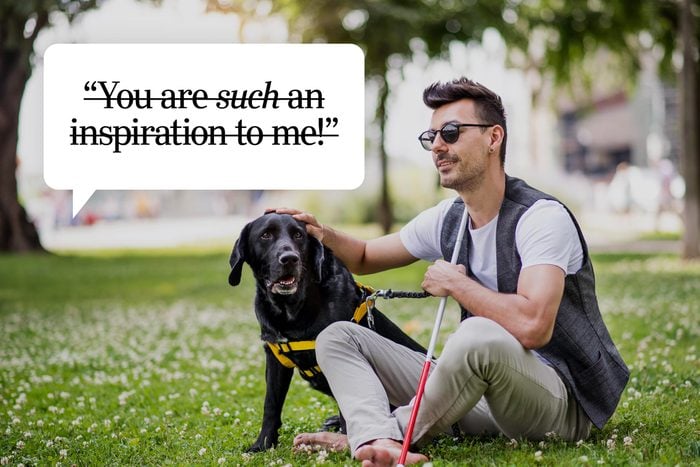
The delicate task of talking about disability
There is no doubt we’ve evolved as a society when it comes to how we treat people living with disabilities. For starters, we discuss disability far more openly now than we did even just a few decades ago—the hashtag #disability boasts over 15 billion views on TikTok, and social media influencers have made huge strides toward normalizing disabilities.
To see a change, just look to the travel industry. These days, you’ll hear stories about disability-friendly airlines making vacations easier for disabled travelers. You’ll come across autism-friendly resorts and tour companies dedicated to those with disabilities.
“Things have gotten better just from social media and people being better advocates for themselves,” observes Allie Schmidt, a disability and accessibility expert and the owner of Disability Dame Consulting, which helps businesses make their packaging and marketing more accessible for the disability community. “There are more institutions throughout the U.S. that are doing a better job of helping people with disabilities advocate for themselves. No one wants to be unaware or do these things unintentionally.”
“Polite” doesn’t always mean “helpful” in the disability community
For those not in the disabled community, however, talking about disability is still a tricky subject. Obviously, using deliberately offensive terms is unacceptable. But according to experts, there’s also the matter of polite habits most people dislike. Several of the “polite” things able-bodied people do or say can actually come off as rude or unhelpful, even when they’re trying to acknowledge someone’s disability with care.
“Words are powerful, and the language we use matters,” says Melissa Blake, a disability expert, activist and social media influencer whose upcoming book—Beautiful People, about what it’s like to live as a disabled person in a non-disabled world—is slated for publication in March 2024. “So much of the language surrounding disability is misguided at best and downright rude and insulting at worst; it’s meant to make non-disabled people less uncomfortable, but it ends up hurting disabled people in the process.”
So how can you navigate these unspoken etiquette rules without unintentionally hurting someone? After all, being mindful of people with disabilities requires a different approach than, say, following proper aging etiquette or mental health etiquette. We asked several people who live with a disability—including Schmidt and Blake—to share their recommendations for avoiding mistakes.
Get Reader’s Digest’s Read Up newsletter for etiquette tips, humor, cleaning, travel, tech and fun facts all week long.
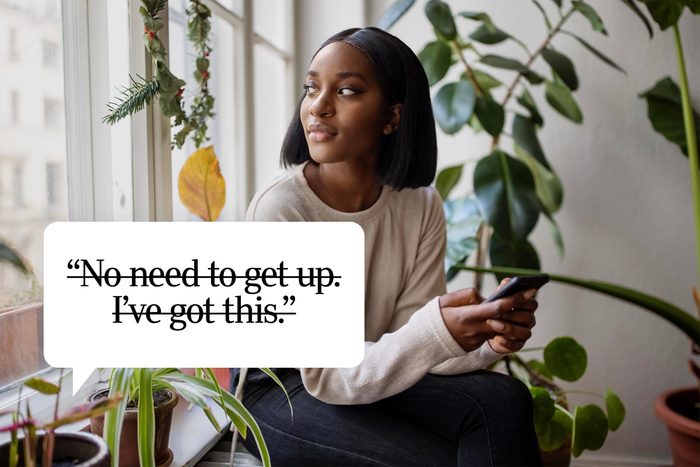
Offering help without asking
Being waited on hand and foot by a caring individual seems like the ultimate dream, right? Not exactly. Just as some of the so-called polite ways people talk about weight are actually insulting, this “polite” habit is really rude.
Telling someone “Don’t trouble yourself” or “I’ll do it for you” actually infantilizes the disabled person. “It’s assumed that disabled people can’t do anything for themselves, and that’s simply not true,” says Blake, who was born with Freeman Sheldon syndrome, a genetic bone and muscular disorder.
Schmidt, who has a rare, undiagnosed motor-neuron disease that has caused the paralyzation of her arms, agrees with Blake, though she offers a bit of nuance: “If it’s one of my good friends, I appreciate [the help] because they’re anticipating my needs. But if it’s just a stranger, we don’t have that type of dynamic yet, so it can feel uncomfortable.”
Say this instead: “What do you need me to do here?” Don’t automatically do something for a person with a disability; wait until they ask for help. “Trust me, if we need help, we’ll ask!” says Blake. Schmidt also advises observing whether the disabled person is struggling. If they have the situation under control, then you’re good. If they look like they’re struggling, then you can ask if they need help.
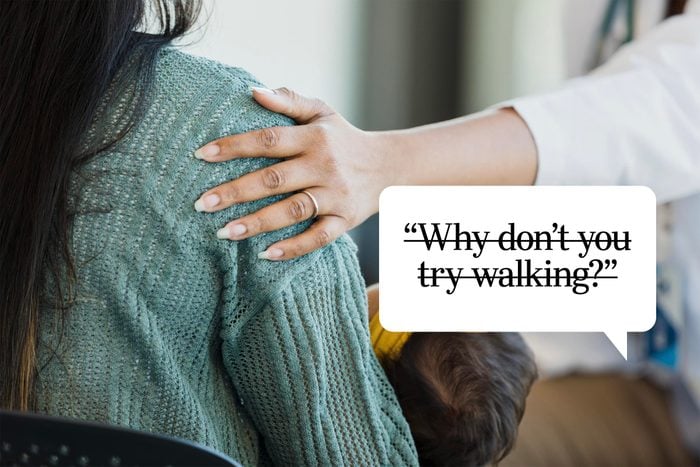
Offering unsolicited advice
Giving unwanted advice is hardly a problem exclusive to people living with a disability. But the last thing any disabled person wants to hear is helpful thoughts from a well-meaning able-bodied person who doesn’t understand their daily experience. Vida Laporta, who was diagnosed with Limb-Girdle Muscular Dystrophy around the age of 30, has a one-word request for those who like to offer unsolicited advice: “Don’t.”
Laporta has had certain people suggest that her legs could improve just by “getting up and walking,” when she “can’t even walk out on [her] driveway.” She’s also had others recommend switching to a different kind of diet. For Laporta, who uses a wheelchair, “[these suggestions] don’t even make sense. They’re just offensive.”
Say this instead: Nothing. It’s a good rule of thumb to keep your advice to yourself unless asked. “Disabled people are the experts on being disabled, and we know ourselves and our disabled bodies inside and out. If we want advice, we’ll ask for it,” says Blake. Good news is, if you ditch the annoying friendship habit of offering unsolicited advice, you can strengthen your relationship.
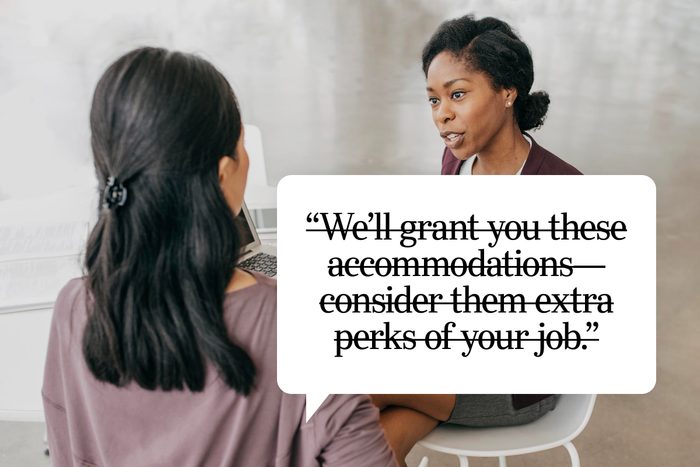
Making a big deal about accommodations
Although Schmidt doesn’t have any direct experience with exaggerated reactions to or pushback on any of her necessary accommodations, she has noticed that companies tend to focus more on business accountability than actually meeting her needs. “As soon as you bring up the word disability,” she says, “people are very attentive, and they’re scared of being held liable for anything.”
From Blake’s perspective, the real issue is that accommodations for disabled people feel like something “extra, an add-on, when in reality, they’re not.”
Say this instead: “How can I help you?” It’s important for able-bodied people to remember that because of the Americans with Disabilities Act, accessibility and accommodations are required by law. There’s no reason to make a scene or go overboard—just accommodate the person’s needs.
And if you find yourself on the wrong side of this conversation? It’s time to rectify the situation. Try saying something like, “I apologize for not being accommodating initially. What can I do for you?” Then avoid making a big deal about someone’s necessary accommodations in the future. “Disability rights are human rights,” reminds Blake. “Our needs shouldn’t be an afterthought.”
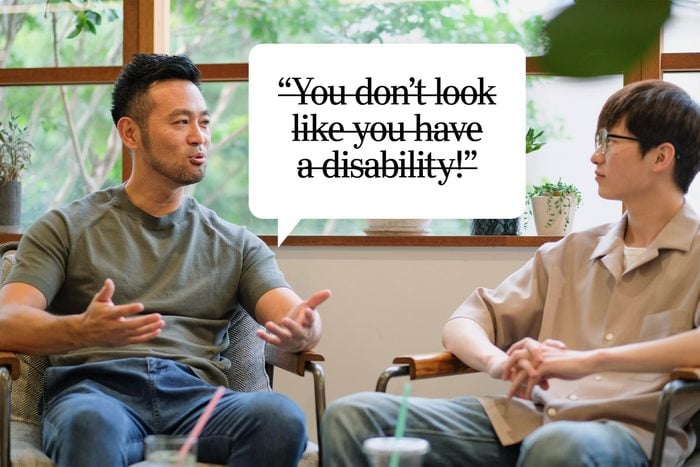
Telling them they don’t look disabled
This may sound like a sincere compliment, but all it does is make disabled people feel more uncomfortable by disregarding a fundamental part of their identity. Besides, not all disabilities are visible. “This happens all the time,” says Schmidt. As an example, she tells Reader’s Digest about a time when she was reprimanded for using an accessible buffet—not once, but twice—because she didn’t “look disabled.”
Laporta says she feels judged whenever she uses a handicap parking space and doesn’t bring her wheelchair or motor chair. Although she can walk short distances, it’s difficult for her, and she sometimes will just hold on to her kids when they go shopping. “But if we were parking in the handicapped space, my kids would be like, ‘Mom, just go in your wheelchair. People are looking,'” she says.
Say this instead: “Thank you for telling me about your disability. I didn’t know.” Since Schmidt’s disability is rare, she understands that people may have never seen someone with paralyzed arms before. But she suggests an easy remedy to non-disabled people for turning everything around by “taking a little humility on” and saying something like “Oh, thank you for telling me that. I didn’t even realize.”
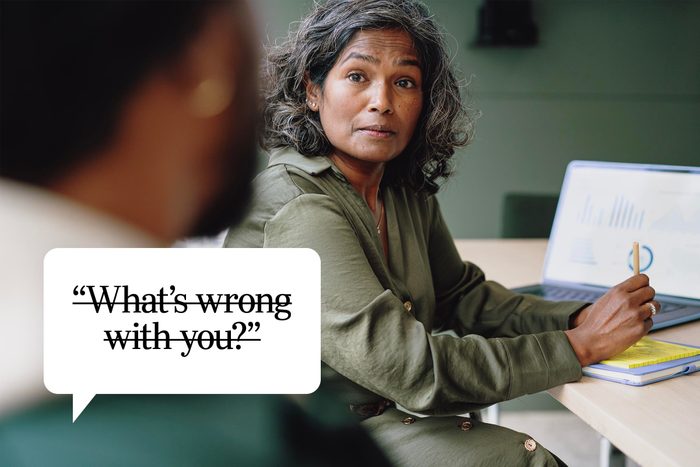
Asking what’s wrong with them
Even though the reasoning behind this kind of question is usually innocent curiosity, there’s an intrusive quality to it, especially when it’s coming from a stranger. (Never mind the fact that you’re suggesting that something about them is, well, wrong.) Schmidt says these questions can make her feel really uncomfortable. “When someone asks me, ‘Can you tell me all the things that are difficult?’ they’re unaware of the position they’re putting me in by having to talk about things I don’t want to talk about,” she says.
That said, although she acknowledges that she may be the exception to the rule, Laporta admits that she prefers people directly ask her about her disability instead of “staring or being judgmental.” This way, “I can educate them about my disability,” she says. “I’m very open about it.”
Say this instead: “I’m just interested in hearing more about your story. What have you learned from this experience?” It can be hard to know what to say in this situation, but there are ways to demonstrate your interest and concern respectfully. Schmidt recommends saying the aforementioned line of questioning as a way to better understand the disabled people you may encounter. She also says that framing these questions in a more positive manner will help elicit a more engaged answer.
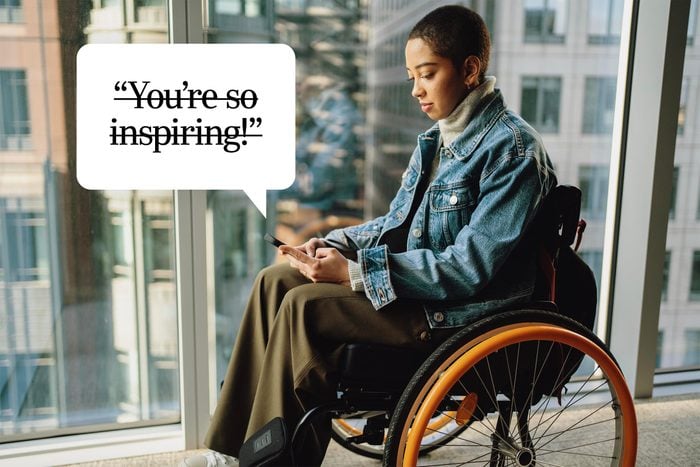
Calling them an inspiration
This is another great example of something that sounds like a lovely compliment on the surface, but more often than not, it can leave the person feeling like they’re being pitied.
“Telling us we’re inspiring is dehumanizing,” says Blake. “It’s saying that we’re inspiring merely for existing.” Schmidt experiences this dehumanizing feeling often in her business when she’s on customer-discovery calls. “In almost every single call, the word inspiring will come up, and it’s just cringy. Please stop saying that to every person with a disability. From the person with a disability’s perspective, what we’re doing is not inspiring at all.”
Say this instead: “I’m so impressed by the work you do in your profession. How did you get started?” Using the term inspiring isn’t always an unprofessional work habit. If you want to call someone with a disability an inspiration, that’s fine—just make sure it’s for their skills and/or talents. “I’m not inspiring because of my disability,” says Blake. “Inspiring for my bylines as a writer? Yes.”
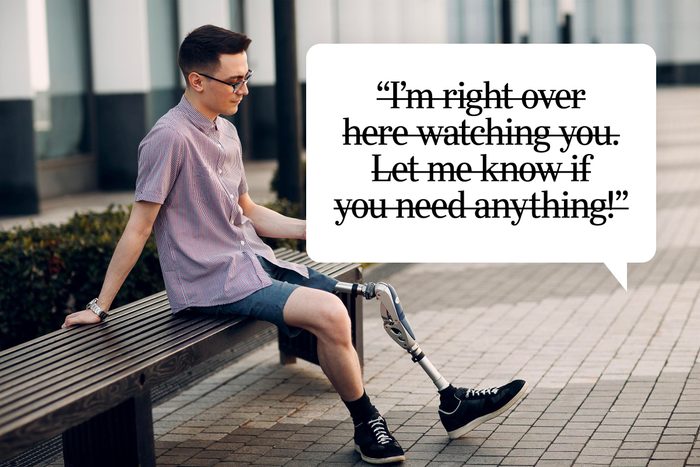
Letting them know you’ll watch to make sure they’re OK
Able-bodied people may think they’re doing a disabled person a solid by keeping an eye on them and being ready to help at a second’s notice. But this is actually an etiquette mistake. This sort of invasive behavior can make the disabled person rather uncomfortable.
Laporta shared a story about how she took her son to the mall for a meal and, because she was using her motor chair and a handicapped table, a well-intentioned person kept hovering and asking multiple times if he could help her. “He sat nearby and was looking at us the whole time,” says Laporta. “I don’t like it when someone’s staring and waiting for me to ask for help.”
Say this instead: “Do you need any help?” Laporta recommends asking once—and only once—if the disabled person needs help and then leaving them alone when you get an answer. “Don’t be overly aggressive,” she says. “Just ask, ‘Do you need any help?'”
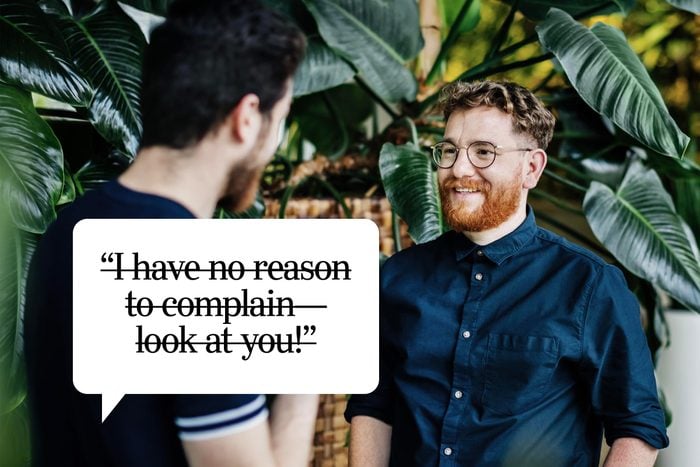
Brushing off your own troubles
While an able-bodied person may think they’re being mindful by acknowledging the difficulties faced by someone with a disability, the truth is they’re assuming disabled people are sitting at home feeling sorry for themselves all the time.
Schmidt says that when someone complains about something mundane and then stops to acknowledge that they have no right to grouse because they’re not disabled like her, “it’s just not a nice thing to do.” She goes on to say that this behavior “can be frustrating because people who do not have disabilities have never experienced what it’s like to acquire one, so they can’t really fathom that someone with a disability could be truly happy on the other side of it.”
Say this instead: “Thank you for listening to me. You’ve been really helpful.” Schmidt suggests simply acknowledging the disabled person for being a good listener during your venting session. There’s no need to apologize or comment on the person’s disability.
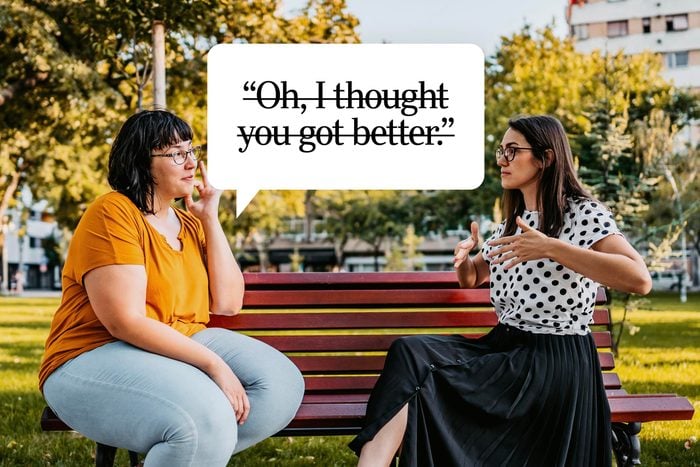
Assuming they “got better”
Although medical treatments are constantly changing, presuming that someone’s disability can be cured is quite hurtful—as is assuming the disability disappeared simply because you don’t see outward signs of it at the moment. Laporta tells Reader’s Digest that she deliberately changed her social media profile photos to ones of her in her wheelchair because several people didn’t believe her muscular dystrophy was a lifelong diagnosis or that there is no cure.
“Whenever I would post pictures of myself in my wheelchair,” she says, “the same people I previously told about my diagnosis would always say, ‘Oh, I thought you got better’ or ‘What happened?”” Laporta says she’s tired of answering the same questions over and over and wishes people would understand that “I’m not going to get better.”
Say this instead: Nothing. Focus instead on acceptance and listening to what the disabled person needs from you. “The biggest tip I always tell a non-disabled person is [to] just listen,” says Blake. “Listen to disabled people when we tell you something is harmful or tell you about the ways to be a better ally.”
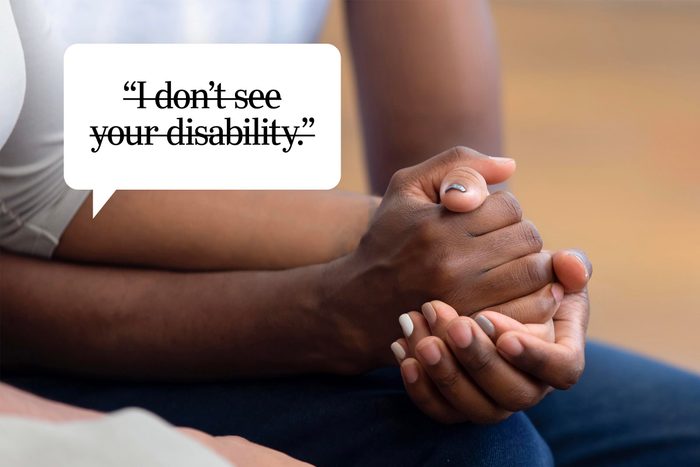
Insisting you don’t see someone as disabled
Saying “I don’t see your disability” is problematic for the same reasons as saying “I don’t see color.” Yes, we’re all human beings, and we should all be viewed equally, but society is complex and filled with nuance. To say “I don’t see your disability” is to dismiss a fundamental part of a person’s identity. “This sounds like a compliment on the surface,” says Blake, “but it’s really an insult.”
Blake goes on to say that this kind of comment “is saying that you don’t see me. I want you to see all of me, and that includes my disability.” She also emphasizes the importance of seeing disabled people—if we don’t, then we’re continuing to ignore ableism, the discrimination or prejudice against people with disabilities.
Say this instead: “I see a wonderful person in front of me.” If you made the mistake of telling someone you don’t see their disability, Blake recommends saying something like, “Thank you for telling me that you want me to see your disability.” This simple remark can make a huge difference in improving allyship toward ableism. If you’re meeting someone with a disability and wish to learn more about them, here is a list of great conversation starters that work much better than “I don’t see your disability.”
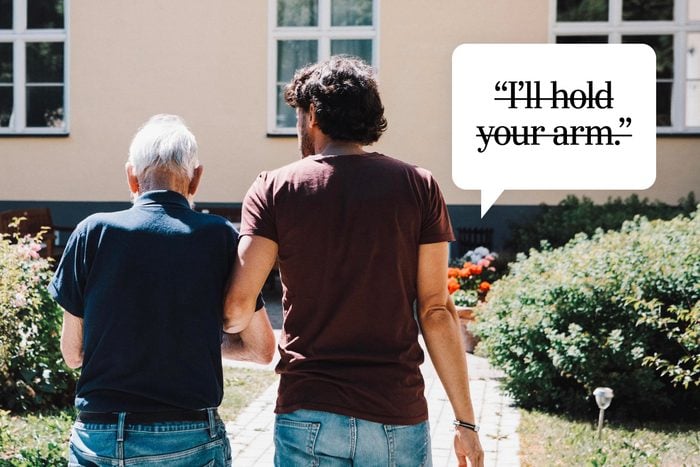
Offering to physically assist
Touching someone (even as a way of helping) without permission is a no-no, and that’s especially true for those with a disability. Offering to hold a disabled person while they walk is, in essence, a good deed, but in certain situations, it could be dangerous.
Laporta shares that she often has people who want to help her either walk or stand up when they see she’s struggling. Unfortunately, unless these people know the exact way to hold her—and in many cases, they don’t—they could end up hurting her.
“They try to grab me or walk with me in a way where I’m going to end up falling, and I don’t feel safe,” says Laporta. “I have to hold someone a certain way, like by their elbow.” Very rarely does anyone ask how they can help her.
Say this instead: “Can you please show me how I can best hold you or walk with you?” Laporta suggests this line of questioning because the disabled person can show you exactly how to assist, allowing everyone to be safe and comfortable.
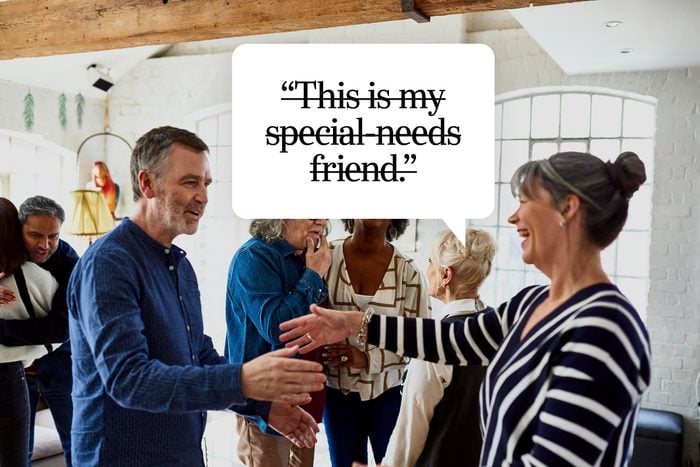
Using terms like “differently abled” and “special needs”
When able-bodied people swap the word disabled for what they believe to be gentler descriptors, all they’re doing is exacerbating the stigma of disability. “The word disabled is not a bad word, but for some reason, society thinks it is,” observes Blake.
Schmidt echoes this sentiment, remarking that she has “been told so many times that I should not refer to my disability as a disability.” In fact, she recounts a time when she was explaining why she can’t shake hands, and an able-bodied person commented, “You don’t have a disability. Your hand is just recharging.”
When it comes down to it, denying a disability (and the term disability) is deeming it shameful. “Calling me anything other than disabled is incredibly problematic because at the core, what you’re saying is that disabilities are bad and something to be ashamed about,” says Blake. “So shameful, in fact, that you can’t even bring yourself to say the word in the first place.”
Say this instead: “Disabled.” Polite people use the word disabled and ditch terms like special needs. While she can’t speak for the entire disability community, Schmidt says that “for the most part, people with disabilities absolutely do not mind referring to themselves as disabled or someone who has a disability.”
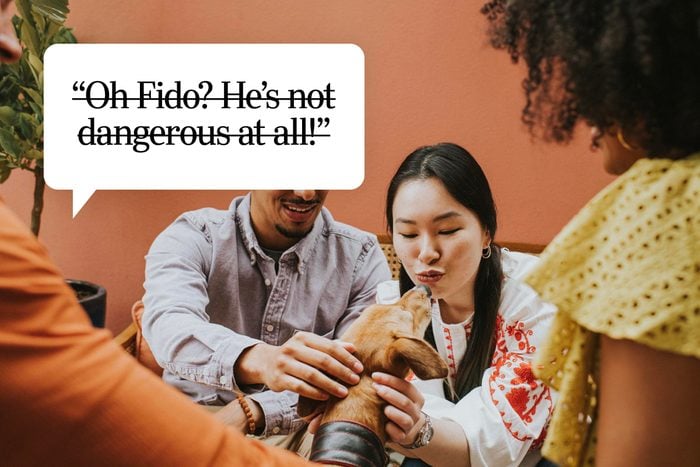
Promising your pet isn’t dangerous
How could your sweet, cuddly dog be a threat to anybody? Well, in some cases, it doesn’t matter how safe Fido is. If someone is disabled and can’t easily stand up or walk, and they’re asking you to move your dog out of the way, they have their reasons.
“I was frightened,” says Laporta of an incident in which she crossed paths with a huge dog. She worried she might fall down because the dog was jumping up and down intensely. The owner ignored Laporta’s protests, promising that the dog didn’t bite. And Laporta came away from the situation feeling as if she was overexaggerating.
Say this instead: “I’m sorry about that. I’ll rein in Fido for you.” Even if your pooch is the gentlest pet you know, it’s important to listen and not dismiss someone’s concerns. You may love having your dog jump on you, but for someone like Laporta, balance can be an issue. “[I] can’t even have the slightest small dog jump on me,” she says. “I fall very easily.”
Sources:
- Melissa Blake, disability expert, activist, social media influencer and author of the forthcoming Beautiful People
- Allie Schmidt, disability and accessibility expert, and owner of Disability Dame Consulting
- Vida Laporta, living with Limb-Girdle muscular dystrophy




















